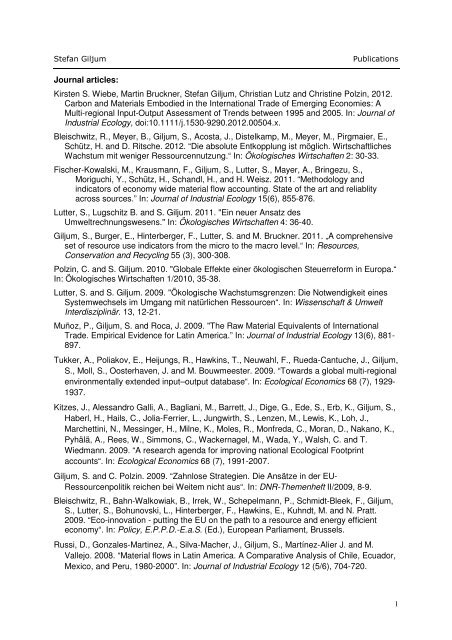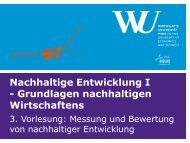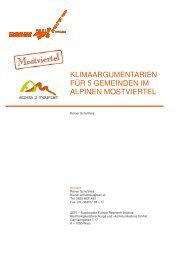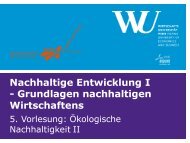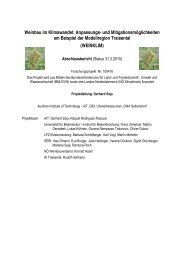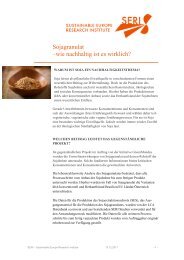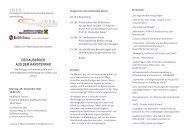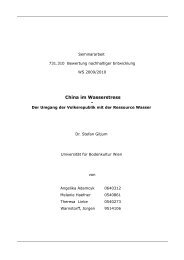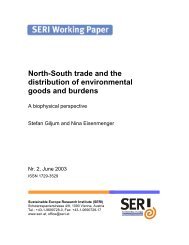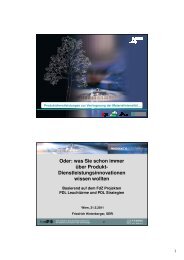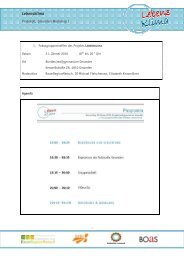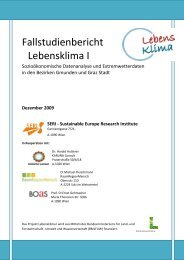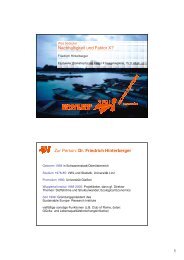Stefan Giljum_Publikationen_280812 - Sustainable Europe ...
Stefan Giljum_Publikationen_280812 - Sustainable Europe ...
Stefan Giljum_Publikationen_280812 - Sustainable Europe ...
Create successful ePaper yourself
Turn your PDF publications into a flip-book with our unique Google optimized e-Paper software.
<strong>Stefan</strong> <strong>Giljum</strong> Publications<br />
Journal articles:<br />
Kirsten S. Wiebe, Martin Bruckner, <strong>Stefan</strong> <strong>Giljum</strong>, Christian Lutz and Christine Polzin, 2012.<br />
Carbon and Materials Embodied in the International Trade of Emerging Economies: A<br />
Multi-regional Input-Output Assessment of Trends between 1995 and 2005. In: Journal of<br />
Industrial Ecology, doi:10.1111/j.1530-9290.2012.00504.x.<br />
Bleischwitz, R., Meyer, B., <strong>Giljum</strong>, S., Acosta, J., Distelkamp, M., Meyer, M., Pirgmaier, E.,<br />
Schütz, H. and D. Ritsche. 2012. “Die absolute Entkopplung ist möglich. Wirtschaftliches<br />
Wachstum mit weniger Ressourcennutzung.“ In: Ökologisches Wirtschaften 2: 30-33.<br />
Fischer-Kowalski, M., Krausmann, F., <strong>Giljum</strong>, S., Lutter, S., Mayer, A., Bringezu, S.,<br />
Moriguchi, Y., Schütz, H., Schandl, H., and H. Weisz. 2011. “Methodology and<br />
indicators of economy wide material flow accounting. State of the art and reliablity<br />
across sources.” In: Journal of Industrial Ecology 15(6), 855-876.<br />
Lutter, S., Lugschitz B. and S. <strong>Giljum</strong>. 2011. "Ein neuer Ansatz des<br />
Umweltrechnungswesens." In: Ökologisches Wirtschaften 4: 36-40.<br />
<strong>Giljum</strong>, S., Burger, E., Hinterberger, F., Lutter, S. and M. Bruckner. 2011. „A comprehensive<br />
set of resource use indicators from the micro to the macro level.“ In: Resources,<br />
Conservation and Recycling 55 (3), 300-308.<br />
Polzin, C. and S. <strong>Giljum</strong>. 2010. "Globale Effekte einer ökologischen Steuerreform in Europa.“<br />
In: Ökologisches Wirtschaften 1/2010, 35-38.<br />
Lutter, S. and S. <strong>Giljum</strong>. 2009. "Ökologische Wachstumsgrenzen: Die Notwendigkeit eines<br />
Systemwechsels im Umgang mit natürlichen Ressourcen“. In: Wissenschaft & Umwelt<br />
Interdisziplinär. 13, 12-21.<br />
Muñoz, P., <strong>Giljum</strong>, S. and Roca, J. 2009. "The Raw Material Equivalents of International<br />
Trade. Empirical Evidence for Latin America.” In: Journal of Industrial Ecology 13(6), 881-<br />
897.<br />
Tukker, A., Poliakov, E., Heijungs, R., Hawkins, T., Neuwahl, F., Rueda-Cantuche, J., <strong>Giljum</strong>,<br />
S., Moll, S., Oosterhaven, J. and M. Bouwmeester. 2009. “Towards a global multi-regional<br />
environmentally extended input–output database“. In: Ecological Economics 68 (7), 1929-<br />
1937.<br />
Kitzes, J., Alessandro Galli, A., Bagliani, M., Barrett, J., Dige, G., Ede, S., Erb, K., <strong>Giljum</strong>, S.,<br />
Haberl, H., Hails, C., Jolia-Ferrier, L., Jungwirth, S., Lenzen, M., Lewis, K., Loh, J.,<br />
Marchettini, N., Messinger, H., Milne, K., Moles, R., Monfreda, C., Moran, D., Nakano, K.,<br />
Pyhälä, A., Rees, W., Simmons, C., Wackernagel, M., Wada, Y., Walsh, C. and T.<br />
Wiedmann. 2009. “A research agenda for improving national Ecological Footprint<br />
accounts“. In: Ecological Economics 68 (7), 1991-2007.<br />
<strong>Giljum</strong>, S. and C. Polzin. 2009. “Zahnlose Strategien. Die Ansätze in der EU-<br />
Ressourcenpolitik reichen bei Weitem nicht aus“. In: DNR-Themenheft II/2009, 8-9.<br />
Bleischwitz, R., Bahn-Walkowiak, B., Irrek, W., Schepelmann, P., Schmidt-Bleek, F., <strong>Giljum</strong>,<br />
S., Lutter, S., Bohunovski, L., Hinterberger, F., Hawkins, E., Kuhndt, M. and N. Pratt.<br />
2009. “Eco-innovation - putting the EU on the path to a resource and energy efficient<br />
economy“. In: Policy, E.P.P.D.-E.a.S. (Ed.), <strong>Europe</strong>an Parliament, Brussels.<br />
Russi, D., Gonzales-Martinez, A., Silva-Macher, J., <strong>Giljum</strong>, S., Martínez-Alier J. and M.<br />
Vallejo. 2008. “Material flows in Latin America. A Comparative Analysis of Chile, Ecuador,<br />
Mexico, and Peru, 1980-2000”. In: Journal of Industrial Ecology 12 (5/6), 704-720.<br />
1
<strong>Stefan</strong> <strong>Giljum</strong> Publications<br />
<strong>Giljum</strong>, S., Behrens, A., Hinterberger, F., Lutz, C. and B. Meyer. 2008. “Modelling scenarios<br />
towards a sustainable use of natural resources in <strong>Europe</strong>”. In: Environmental Science and<br />
Policy 11 (3), 204-216.<br />
<strong>Giljum</strong>, S. and S. Lutter. 2007. “Welthandel und Umweltverbrauch. Theorie, Trends,<br />
Politikoptionen”. In: Europa Info, Magazin zur EU-Umweltpolitik 11/07, 14-15.<br />
Behrens, A., <strong>Giljum</strong>, S., Kovanda, J. and S. Niza. 2007. “The material basis of the global<br />
economy. World-wide patterns in natural resource extraction and their implications for<br />
sustainable resource use policies”. In Ecological Economics 64 (2), 444-453.<br />
Hammer, M., <strong>Giljum</strong>, S., Luks, F. and M. Winkler. 2006. “Die ökologische Nachhaltigkeit<br />
regionaler Metabolismen: Materialflussanalysen der Regionen Hamburg, Wien und<br />
Leipzig“. [Ecological sustainability or regional metabolisms: Material flow analyses of the<br />
regions of Hamburg, Vienna and Leipzig]. In: Natur und Kultur, 7 (2), 62-78.<br />
Rodrigues, J., Domingos, T., <strong>Giljum</strong>, S. and F. Schneider. 2006. “Designing an indicator of<br />
environmental responsibility”. In: Ecological Economics. 59 (3), 256-266.<br />
<strong>Giljum</strong>, S., Hak, T., Hinterberger, F. and J. Kovanda. 2005. “Environmental governance in the<br />
<strong>Europe</strong>an Union: strategies and instruments for absolute decoupling”. In: International<br />
Journal for <strong>Sustainable</strong> Development, 8 (1/2), 31-46.<br />
Rodrigues, H. and S. <strong>Giljum</strong>. 2005. “The accounting of indirect material requirements in<br />
material flow-based indicators”. In: ICFAI Journal of Environmental Economics. III (2), 51-<br />
69.<br />
<strong>Giljum</strong>, S. 2004. “Trade, material flows and economic development in the South: the example<br />
of Chile”. In: Journal of Industrial Ecology. 8 (1-2), 241-261.<br />
<strong>Giljum</strong>, S. and K. Hubacek. 2004. “Alternative approaches of physical input-output analysis to<br />
estimate primary material inputs of production and consumption activities”. In: Economic<br />
Systems Research. 16 (3), 301-310.<br />
<strong>Giljum</strong>, S. and N. Eisenmenger. 2004. “International trade and the distribution of<br />
environmental goods and burdens: a biophysical perspective”. In: Journal of Environment<br />
and Development. 13 (1), 73-100.<br />
<strong>Giljum</strong>, S., Hubacek, K. and L. Sun. 2004. “Beyond the simple material balance: a reply to<br />
Sangwong Suh's note on physical input-output analysis”. In: Ecological Economics. 48 (1),<br />
19-22.<br />
Hubacekm, K. and S. <strong>Giljum</strong>. 2003. “Applying physical input-output analysis to estimate land<br />
appropriation of international trade activities”. In: Ecological Economics 44 (1), 137-151.<br />
<strong>Giljum</strong>, S. 2002. “Globaler Freihandel und Nachhaltige Entwicklung. Utopie oder Realität?“<br />
[Global free trade and sustainable development. Utopia or reality?]. In: Kurswechsel.<br />
4/2002, 75-85.<br />
Wackernagel, M. and S. <strong>Giljum</strong>. 2001. “Der Import von ökologischer Tragfähigkeit: Globaler<br />
Handel und die Akkumulation von ökologischen Schulden“. [Importing carrying capacity:<br />
global trade and the accumulation of ecological debt]. In: Natur und Kultur. 2 (1), 33-54.<br />
<strong>Giljum</strong>, S. and F. Hinterberger. 2000. “Wie misst man ökologische Nachhaltigkeit? Ein<br />
Vergleich ausgewählter Methoden des ’Physical Accounting’” [How do we measure<br />
ecological sustainability? A comparison of selected physical accounting methodologies].<br />
In: Natur und Kultur. 1 (2), 26-43.<br />
2
<strong>Stefan</strong> <strong>Giljum</strong> Publications<br />
Books and book chapters:<br />
<strong>Giljum</strong>, S., Lutz, C., Jungnitz, A., Bruckner, M. and Hinterberger, F. 2011. "<strong>Europe</strong>an<br />
Resource Use and Resource Productivity in a Global Context.” In: Ekins, P., Speck S.<br />
(Eds): “Environmental Tax Reform (ETR). A Policy for Green Growth.” Oxford University<br />
Press. Oxford.<br />
<strong>Giljum</strong>, S., Lutz, C., Polzin, C. 2011. "Global Economic and Environmental Impacts of an<br />
ETR in <strong>Europe</strong>.” In: Ekins, P., Speck, S. (Eds): “Environmental Tax Reform (ETR). A<br />
Policy for Green Growth.” Oxford University Press, Oxford.<br />
Lutz, C. and <strong>Giljum</strong>, S. 2009. “Global resource use in a business-as-usual world until 2030.”<br />
Updated results from the GINFORS model. In: Bleischwitz, R., Welfens, P.J.J., Zhang,<br />
Z.X. (Eds.), <strong>Sustainable</strong> Growth and Resource Productivity. Economic and Global Policy<br />
Issues, Greenleaf Publishing.<br />
<strong>Giljum</strong>, S. and K. Hubacek. 2009. "Conceptual foundations and applications of physical inputoutput<br />
tables". In: Suh, S. (Ed.). Handbook of input-output economics for industrial<br />
ecology. Springer: Dordrecht, The Netherlands, 61-75.<br />
<strong>Giljum</strong>, S., Hinterberger, F., Lutz, C. and B. Meyer. 2009. "Accounting and modelling global<br />
resource use: material flows, land use and input-output models". In: Suh, S. (Ed.).<br />
Handbook of input-output economics for industrial ecology. Springer: Dordrecht, The<br />
Netherlands, 139-160.<br />
<strong>Giljum</strong>, S., Hinterberger, F., Lutz, C. and B. Meyer. 2008. “Accounting and modelling global<br />
resource use: material flows, land use and input-output models”. In: Suh, S. (ed.),<br />
Handbook of input-output economics for industrial ecology. Springer: Dordrecht, The<br />
Netherlands.<br />
<strong>Giljum</strong>, S. and K. Hubacek. 2008. “Conceptual foundations and applications of physical inputoutput<br />
tables”. In: Suh, S. (ed.), Handbook of input-output economics for industrial<br />
ecology. Springer: Dordrecht, The Netherlands.<br />
Jäger, J. 2007. “Was verträgt unsere Erde noch? Wege in die Nachhaltigkeit”. With the<br />
support of Lisa Bohunovsky, <strong>Stefan</strong> <strong>Giljum</strong>, Fritz Hinterberger, Ines Omann and Doris<br />
Schnepf. Fischer: Frankfurt.<br />
Muradian, R. and S. <strong>Giljum</strong>. 2007. “Physical trade flows of pollution-intensive products:<br />
Historical trends in <strong>Europe</strong> and the world”. In: A. Hornborg, J. McNeill and J. Martinez-<br />
Alier (eds.). Rethinking Environmental History: World-System History and Global<br />
Environmental Change. Altamira Press.<br />
Eisenmenger, N. and S. <strong>Giljum</strong>. 2006. “Evidence from Societal Metabolism Studies for<br />
Ecological Unequal Trade”. In: A. Hornborg and C.L. Crumley (eds.). The World System<br />
and the Earth System. Global Socio-Environmental Change and Sustainability since the<br />
Neolithic. Left Coast Press Inc.: Walnut Creek, California. 288-302.<br />
<strong>Giljum</strong>, S. 2006. “Material flow-based indicators for evaluation of eco-efficiency and<br />
dematerialisation policies”. In: P. Lawn (ed.). Sustainability indicators in Ecological<br />
Economics, 376-398. Edward Elgar: Cheltenham.<br />
3
<strong>Stefan</strong> <strong>Giljum</strong> Publications<br />
<strong>Giljum</strong>, S., Hinterberger, F., Wackernagl, M. and J. Kitzes. 2006. “Resource use indicators in<br />
the <strong>Europe</strong>an Union. Policy processes, indicator sets and criteria for a headline indicator.”<br />
Aachen Foundation Kathy Beys: Aachen, Germany.<br />
Rocholl, M., <strong>Giljum</strong>, S. and K. Schlegelmilch. 2006. “Factor X and the EU: How to make<br />
<strong>Europe</strong> the most resource and energy efficient economy in the world. A guidebook to<br />
policies and legislative initiatives within the <strong>Europe</strong>an Union.” Aachen Foundation Kathy<br />
Beys: Aachen, Germany.<br />
<strong>Giljum</strong>, S., Hinterberger, F. and J. Köhn. 2001. “On the Interrelation of Social, Economic and<br />
Ecological Systems – theoretical approaches and policy implications on the feasibility of<br />
comprehensive sustainability”. In: M. Matthies, H. Malchow and J. Kriz (eds.). Integrative<br />
Systems Approaches to Natural and Social Sciences. Springer-Verlag: Berlin.<br />
<strong>Giljum</strong>, S., Hammer, M., Langer, M., Rammel, C. and C. Zazjal. 1999. "Handbuch<br />
Nachhaltige Entwicklung. Gemeinsam unsere Lebensqualität verbessern.“ Teil 2<br />
[Handbook <strong>Sustainable</strong> Development: Improving our Quality of Life. Part 2]. Forum<br />
Umweltbildung: Vienna.<br />
Project reports and studies:<br />
Lutter, S., Polzin, C., <strong>Giljum</strong> S., Patz, T. Pálfy, T., Dittrich, M., Kernegger L. and A. Rodrigo.<br />
2011. “Under Pressure - How our material consumption threatens the planet's water<br />
resources.” Vienna/Brussels.<br />
Bruckner, M., Polzin, C. and <strong>Giljum</strong> S. 2010. “Counting CO2 emissions in a Globalised World.<br />
Producer versus consumer-oriented methods of CO2 accounting.” DIE Research Project<br />
“Development Policy: Questions for the Future”, Discussion Paper 9/2010. Available at:<br />
http://seri.at/wp-content/uploads/2009/11/Bruckner-et-al-2010_Counting-CO2emissions.pdf<br />
<strong>Giljum</strong>, S., Dittrich, M., Bringezu, S., Polzin, C. and Lutter, S. 2010. "Resource use and<br />
resource productivity in Asia: Trends over the past 25 years.” SERI Working Paper 11.<br />
<strong>Sustainable</strong> <strong>Europe</strong> Research Institute, Wien.<br />
Wiedmann, T., Wilting, H., Lutter, S., Palm, V., <strong>Giljum</strong>, S., Wadeskog, A. and Nijdam, D.<br />
2009. "Development of a methodology for the assessment of global environmental<br />
impacts of traded goods and services.” Final Report of the SKEP ERA-NET Project<br />
EIPOT. Environment Agency UK.<br />
<strong>Giljum</strong>, S., Burger, E., Lutter, S. and F. Hinterberger. 2009. “A comprehensive set of<br />
resource use indicators from the micro to the macro level”. SERI Working Paper No. 9.<br />
<strong>Sustainable</strong> <strong>Europe</strong> Research Institute, Vienna.<br />
Lutter, S., Wilting, H., Wiedmann, T., Palm, V., <strong>Giljum</strong>, S., Wadeskog, A. and D. Nijdam.<br />
2008. “Development of a methodology for the assessment of global environmental<br />
impacts of traded goods and services”. Revised Final Report, ERA-NET SKEP Project<br />
EIPOT (Development of a methodology for the assessment of global environmental<br />
impacts of traded goods and services). Also available at http://www.eipot.eu<br />
Praschl, C., Lutter, S. and <strong>Giljum</strong>, S. 2008. “EXIOPOL - Technical report on sources for<br />
resource stock data for EU25 and RoW.”<br />
Lutter, S., Wilting, H., Wiedmann, T., Palm, V. and <strong>Giljum</strong>, S. 2008. “Interim-Report on the<br />
results of the evaluation of methodologies assessed with the RACER framework.” 7<br />
4
<strong>Stefan</strong> <strong>Giljum</strong> Publications<br />
October 2008. ERA-NET SKEP Project EIPOT (Development of a methodology for the<br />
assessment of global environmental impacts of traded goods and services).<br />
Lutter, S. and <strong>Giljum</strong>, S. 2008. “Technical Report on the compilation of the material flow<br />
database for www.materialflows.net.”<br />
<strong>Giljum</strong>, S. and S. Lutter. 2008. “Development of RACER Evaluation Framework”. EIPOT<br />
Work Package 2, ERA-NET SKEP Project EIPOT (Development of a methodology for the<br />
assessment of global environmental impacts of traded goods and services). Also available<br />
at http://www.eipot.eu<br />
Moll, S., <strong>Giljum</strong>, S., Lutter, S. and J. Acosta. 2008. “Technical Report on Basic Conceptions<br />
for Environmental Extensions of Input-Output Framework”. Report of the EU FP-6 project<br />
EXIOPOL(A New Environmental Accounting Framework Using Externality Data and Input-<br />
Output Tools for Policy Analysis), Deliverable DIII.2.b-1 & DIII.3.b-1. Also available at<br />
http://www.feem-project.net/exiopol<br />
<strong>Giljum</strong>, S., Lutz, C., Jungnitz, A., Bruckner, M. and F. Hinterberger. 2008. “Global dimensions<br />
of <strong>Europe</strong>an natural resource use. First results from the Global Resource Accounting<br />
Model (GRAM)”. SERI Working Paper 7. <strong>Sustainable</strong> <strong>Europe</strong> Research Institute, Vienna.<br />
Best, A., <strong>Giljum</strong>, S., Simmons, C., Blobel, D., Lewis, K., Hammer, M., Cavalieri, S., Lutter, S.<br />
and C. Maguire. 2008. “Potential of the Ecological Footprint for monitoring environmental<br />
impacts from natural resource use: Analysis of the potential of the Ecological Footprint<br />
and related assessment tools for use in the EU’s Thematic Strategy on the <strong>Sustainable</strong><br />
Use of Natural Resources”. Report to the <strong>Europe</strong>an Commission, DG Environment.<br />
Brussels.<br />
<strong>Giljum</strong>, S., Lutz, C. and Jungnitz, A., 2008. “The Global Resource Accounting Model<br />
(GRAM). A methodological concept paper”. SERI Studies 8. <strong>Sustainable</strong> <strong>Europe</strong><br />
Research Institute, Vienna.<br />
<strong>Giljum</strong>, S., Behrens, A., Hinterberger, F., Lutz, C. and B. Meyer. 2007. “Modelling scenarios<br />
towards a sustainable use of natural resources in <strong>Europe</strong>”. SERI Working Paper No. 4.<br />
<strong>Sustainable</strong> <strong>Europe</strong> Research Institute, Vienna.<br />
<strong>Giljum</strong>, S., Hinterberger, F., Jäger, J., Karlsson, S., Lorek, S., Kaivo-oja, J., Kemp, R.,<br />
Kinnunen, V., Luukkanen, J., Schnepf, D. and A. Schreuer. 2006. “Environment and<br />
Innovation. New environmental concepts and technologies and their implications for<br />
shaping the future EU environmental policies”. Final report on environmental concepts<br />
and technologies.<br />
Hammer, M. and S. <strong>Giljum</strong>. 2006. “Materialflussanalysen der Regionen Hamburg, Wien und<br />
Leipzig”. NEDS Working Paper No. 6, Hamburg.<br />
Schreuer, A. (ed.). 2006. “Reduktion des Ressourcenverbrauchs: Von der Vision zur Praxis”.<br />
With contributions by Arno Behrens, <strong>Stefan</strong> <strong>Giljum</strong>, Mark Hammer, Friedrich Hinterberger<br />
and Sylvia Lorek. SERI Background Paper No. 8. <strong>Sustainable</strong> <strong>Europe</strong> Research Institute,<br />
Vienna.<br />
Jölli, D. and S. <strong>Giljum</strong>. 2005. “Unused biomass extraction in agriculture, forestry and fishery”.<br />
SERI Studies No. 3. <strong>Sustainable</strong> <strong>Europe</strong> Research Institute, Vienna.<br />
<strong>Giljum</strong>, S., Hammer, M. and F. Hinterberger. 2004. “Resource use scenarios for <strong>Europe</strong> in<br />
2020”. SERI Study No. 1. <strong>Sustainable</strong> <strong>Europe</strong> Research Institute, Vienna.<br />
5
<strong>Stefan</strong> <strong>Giljum</strong> Publications<br />
Rodrigues, J. and S. <strong>Giljum</strong>. 2004. “The accounting of indirect material requirements in<br />
material flow-based indicators”. SERI Working Paper No. 3. <strong>Sustainable</strong> <strong>Europe</strong> Research<br />
Institute, Vienna.<br />
<strong>Giljum</strong>, S. and N. Eisenmenger. 2003. “North-South trade and the distribution of<br />
environmental goods and burdens. A biophysical perspective”. SERI Working Paper No.2.<br />
<strong>Sustainable</strong> <strong>Europe</strong> Research Institute, Vienna.<br />
Hammer, M., <strong>Giljum</strong>, S., Bargigli, S. and F. Hinterberger. 2003. “Material flow analysis on the<br />
regional level: questions, problems, solutions”. NEDS Working Paper No. 2, Hamburg.<br />
Hinterberger, F., <strong>Giljum</strong>, S. and M. Hammer. 2003. “Material flow accounting and analysis<br />
(MFA). A valuable tool for analyses of nature-society interrelationships”. SERI Background<br />
Paper No. 2. <strong>Sustainable</strong> <strong>Europe</strong> Research Institute, Vienna.<br />
Hinterberger, F., <strong>Giljum</strong>, S. and M. Hammer. 2003. “Material Flow Accounting and Analysis<br />
(MFA)”. Entry for the Internet Encyclopaedia of Ecological Economics.<br />
Döppe, T., <strong>Giljum</strong>, S., Hammer, M., Hinterberger, F., Luks, F., Schnepf, D. und J.H.<br />
Spangenberg. 2002. “Freier Handel, nachhaltiger Handel – ein Widerspruch?” [Free trade,<br />
sustainable trade – a contradiction?]. World Summit Papers of the Heinrich-Böll-<br />
Foundation, No. 21.<br />
<strong>Giljum</strong>, S. and K. Hubacek. 2001. “International trade, material flows and land use:<br />
developing a physical trade balance for the <strong>Europe</strong>an Union”. Interim Report IR-01-59.<br />
International Institute for Applied Systems Analysis (IIASA). Laxenburg, Austria.<br />
Conference proceedings and conference presentations:<br />
Illge, L., Hubacek, K. and S. <strong>Giljum</strong>. 2002. “Is there a role for EU Integrated Product Policy<br />
(IPP) in solving global environmental problems?” In: F. Biermann et al. (eds.).<br />
Proceedings of the 2001 IHDP conference on “Global Environmental Change and the<br />
Nation State. Potsdam, 183-191.<br />
Grey literature:<br />
<strong>Giljum</strong>, S. 2003. “Biophysical dimensions of North-South trade: material flows and land use”.<br />
PhD thesis. University of Vienna.<br />
<strong>Giljum</strong>, S. 1999. “Der ökologische Fußabdruck des Bananenanbaus in Costa Rica” [The<br />
ecological footprint of banana production in Costa Rica]. Master thesis. University of<br />
Vienna.<br />
Media contributions:<br />
-<br />
6


